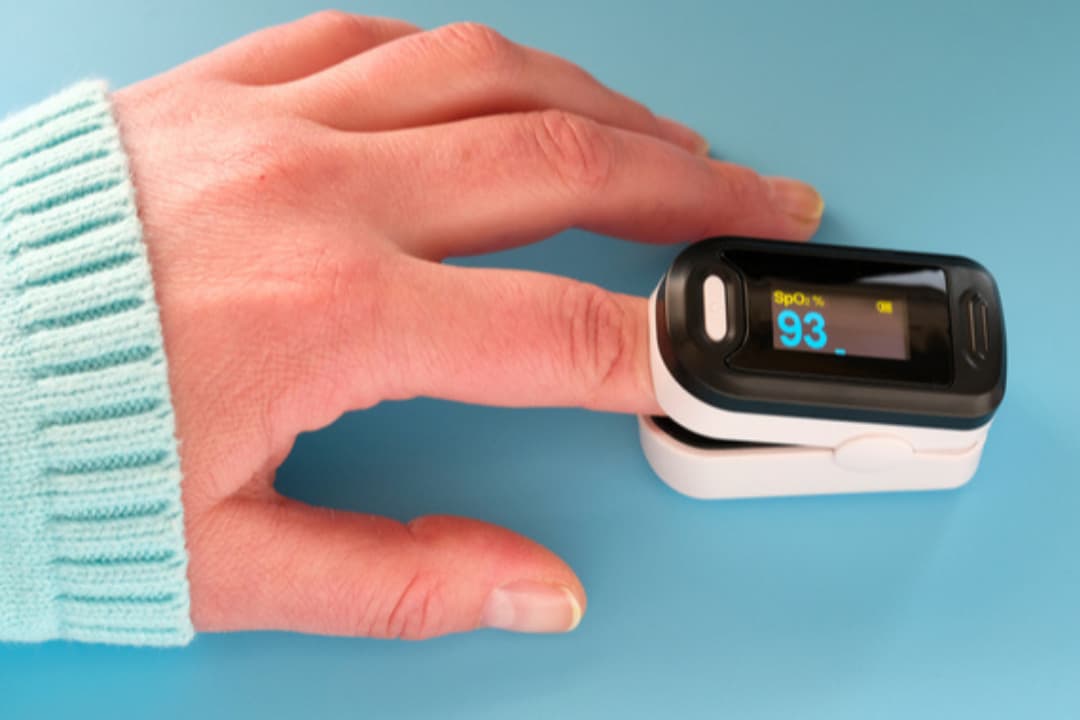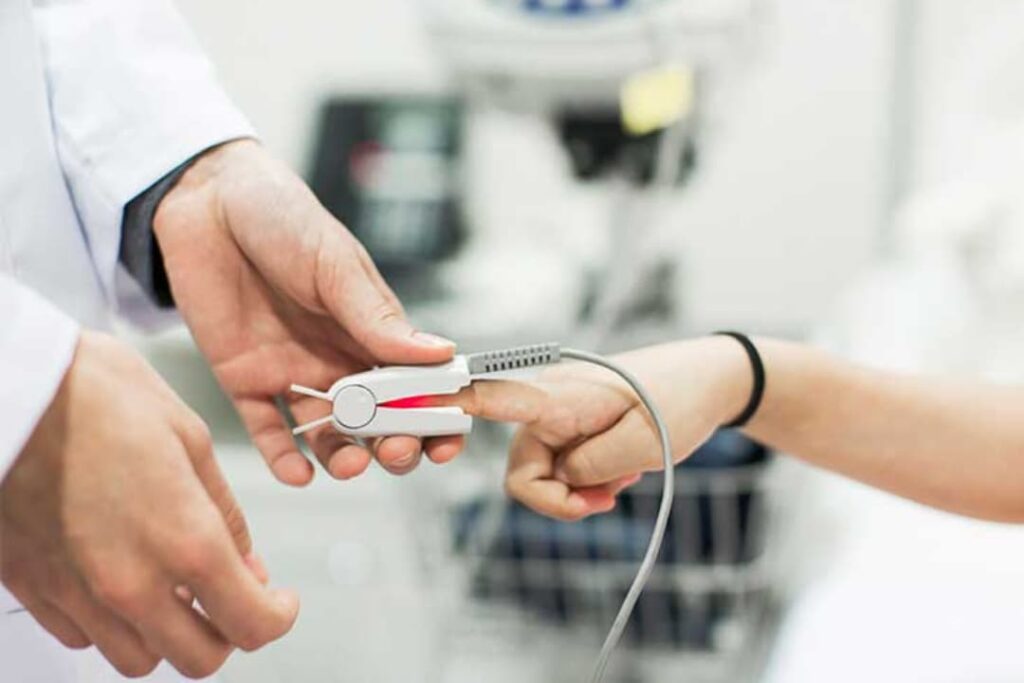Things To Know About Pulse Oximeter

Pulse oximetry is a measure of how much oxygen is in the blood.
If you or someone in your home uses oxygen therapy or has certain chronic heart and lung problems, It’s worth adding a pulse oximeter to your medicine cabinet.
A pulse oximeter is a small, lightweight device used to monitor the amount of oxygen carried in the body. It’s crucial to know if your body is getting enough oxygen because low oxygen levels can be fatal in just a few minutes. Read on to learn more things about Pulse Oximeters!
What is Pulse Oximeter?

A pulse oximeter is a device used to measure your pulse rate and the percentage of oxygen in your blood and shows digital readings for both in a matter of seconds. It is a quick and painless measure of how well your body moves oxygen to your heart.
Pulse oximetry measures the percentage of oxygen in haemoglobin proteins, called oxygen saturation. Oxygen saturation usually indicates how much oxygen is getting to the organs.
This small device uses two non-invasive LED lights when you place your fingertip into it, one red (which measures deoxygenated blood) and the other infrared (which measures oxygenated blood) (which measures oxygenated blood). A photodetector reads the light absorption from these two beams of different wavelengths to calculate the oxygen saturation level Percentage.
An oxygen saturation level of 95% to 100% is considered typical. You should seek medical attention immediately if it’s less than 90%.
How Does Pulse Oximeter Works?
Pulse oximeters are clip-on devices that measure oxygen saturation.
The pulse oximeter shines two lights through your fingertip or earlobe: one red light and one infrared light. Deoxygenated blood absorbs red light, and oxygenated blood absorbs infrared light. The monitor uses an algorithm to calculate oxygen saturation based on light absorption differences. Clips can be attached to specific body parts, such as the fingertip, toes, earlobe, and forehead, to obtain readings.
The fingertip pulse oximeter is the most common type for home use. You must follow the manufacturer’s instructions for proper use because not all versions are identical. Typically, you sit still, clip the small device to your fingertip, and display your reading in less than a minute. Some types are only for adults; others are suitable for children.
Since pulse oximetry relies on light absorption through a tissue bed with pulsating blood, various factors can interfere with those parameters, leading to a false reading, such as:
- Nail Polish
- Cold hands
- Poor circulation
- Dark skin tone
- Movement
- A history of smoking
How To Read Pulse Oximeter
All monitors have an electronic result display. On a pulse oximeter, there are two readings: oxygen saturation percentage, abbreviated as SpO2, and pulse rate. A typical adult’s resting heart rate ranges from 60 to 100 beats per minute (often lower for athletes), while a healthy resting heart rate is often below 90 beats per minute.
Healthy individuals have an oxygen saturation level of between 95% and 100%, while people with chronic lung diseases may have a reading below 95%. A reading of less than 90% is a medical emergency requiring immediate medical attention.
Don’t rely on medical equipment to alert you to a problem. Pay attention to other signs of low blood oxygen levels, such as:
- Difficulty breathing
- A cough that gets worse
- A racing heart rate
- Lung infection
- Restlessness
- A dusky blue appearance on the face, lips, or nails
- Drug interference from anaesthesia, muscle relaxants, or anaphylaxis
Benefits Of Pulse Oximeter
A pulse oximeter is most useful for people with lung and heart problems, which can cause abnormal oxygen levels.
Pulse oximetry can also provide feedback on the effectiveness of breathing supports like oxygen therapy and ventilators.
Some benefits of pulse oximetry include:
- Monitor oxygen saturation over time.
- Alert to dangerously low oxygen levels, particularly in newborns.
- Offer peace of mind to people with chronic respiratory or cardiovascular conditions.
- Assess the need for supplemental oxygen.
- Indicate dangerous side effects in people taking drugs that affect breathing or oxygen saturation.
- Monitor oxygen saturation levels in people under anesthesia.
- Determine the effectiveness of breathing interventions, such as oxygen therapy and ventilators.
- Doctors assess the patient’s safety during physical activity or exercise (e.g., in people with cardiovascular or respiratory problems).
Some doctors use pulse oximetry to check the safety of physical exercise in people with cardiovascular or respiratory problems, or they may recommend that people wear one while exercising. Pulse oximetry may also be used as part of a stress test by a doctor.
Moreover, pulse oximeters are used in neonatal intensive care units to help workers if oxygen saturation falls below a certain level. Patients at risk of sudden infant death syndrome (SIDS) and sleeping accidents benefit from these devices.
Where Can You Get a Pulse Oximeter in UAE?
Pulse oximetry is an important tool for monitoring patients who are undergoing surgery, recovery from anesthesia, or intensive care. Abonemed Medical Equipment is one of the leading manufacturers of pulse oximeters and other medical equipment suppliers in UAE. Our pulse oximeters are easy to operate and provide accurate results. We offer our pulse oximeters at affordable prices. We are committed to offering the best value and highest quality products to our customers. We are dedicated to providing excellent customer service and support.
Abonemed Medical Equipment LLC is known to be the best pulse oximeter supplier UAE and is trusted by many hospitals, clinics, and laboratories.
Vasith Faisal is the Medical Equipment Expert at Abonemed LLC. With a background in Computer Science Engineering and a wealth of experience in the healthcare industry, Vasith is well-versed in the latest technologies and trends in medical equipment. He has a proven track record of driving successful initiatives that drive growth and engagement, and is known for his innovative, data-driven approach and his ability to lead high-performing teams. Whether you’re looking for advice on the best products for your healthcare facility or you need support with maintenance and repairs, Vasith is here to help.
